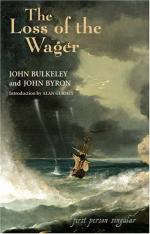|
This section contains 600 words (approx. 2 pages at 300 words per page) |

|
1723-1786
British Explorer and Naval Admiral
After the exploration of Australia and New Zealand by Dutchman Abel Tasman (c. 1603-1659), a feverish period of sea exploration began, setting the stage for a surge in European colonialism during the eighteenth and nineteenth centuries. Since Ferdinand Magellan's (1480?-1521) first circumnavigation in 1520, the globe had been circled by ship numerous times. However, the need for faster, easier trade routes and a curiosity about unknown lands fueled a new breed of seaman. Admiral John Byron of the British Navy, sent to find the elusive "southern continent," discovered the Falkland Islands as well as many other smaller islands in what would be the fastest circumnavigation at the time.
 John Byron. (National Maritime Museum. Reproduced with permission.)
John Byron. (National Maritime Museum. Reproduced with permission.)
Born into a family of Navy men, Lord Byron began his naval career in 1731 at age nine, when he became a midshipman. Nine years later...
|
This section contains 600 words (approx. 2 pages at 300 words per page) |

|


